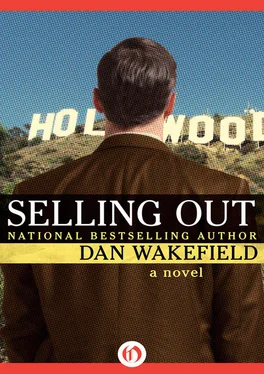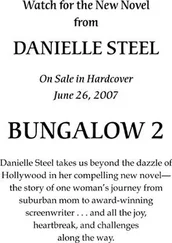He had never seen the film with commercials before, the screenings had simply gone to black at the ending of the acts, the breaks where commercials would be shown, and he had feared that the appearance of the usual hyped-up jingle-jangle pitches for cars and colas, pizza and pantyhose, would break the dramatic spell of the film, would seem like simpleminded mockery of the emotions being portrayed so poignantly.
To his total surprise, however, the commercial interruptions seemed to him to actually enhance the overall effect of the story. After the action had gone to a certain pitch of emotion or point of plot, the total break from it seemed a relief, a chance to catch your breath—yes, even go to the bathroom, what was so bad about that need?—refill your glass, stand up and stretch, or simply to watch the sales pitch for whatever it was and divert your mind from concentrating on what had just been absorbing it. Besides, if it weren’t for the commercials, this miracle wouldn’t be happening at all, this fabulous transmission of a wonderful drama into homes all over America wouldn’t be possible. To the amusement of the others, Perry actually cheered the commercials!
“Eat those vitamins!” he shouted, standing up and shaking his fist with frenetic fervor.
Perry had also fretted beforehand that seeing the show on the small screen would be a real downer after having viewed it so often in the luxurious large expanse of a movie-size screen in a projection room, and yet in fact the whole thing looked better to him. During one commercial break he stopped cheering long enough to ask the others if in fact he was crazy, or if the film didn’t seem more effective on the smaller screen.
“That,” explained Kenton with a smile, “is what it was made for, you see.”
“It’s amazing but true,” Ned said. “In this case, smaller is better.”
What a miracle.
The next morning the miracle grew.
Ned’s secretary let out such a scream that office doors flew open all up and down the hall, and Perry joined everyone else in rushing to see what happened.
“We got great numbers!” she shouted, waving a single sheet of mimeographed paper that Ned Gurney grabbed from her hand and began to pore over as if it were some kind of code that foretold the future.
In a way, it was. These were the overnights, the Nielsen ratings computed on the spot in the three major markets of New York City, Chicago, and Los Angeles. The final computations of the previous evening’s television viewing audience for the whole nation would not be ready and released till the following week, but this first quick bulletin from the entertainment battlefront conveyed to the contending forces the running of the tides that would carry them irrevocably on to victory or defeat.
Executives and secretaries, electricians and actresses, makeup artists and film editors, all rushed as breathlessly and eagerly to hear the news, for whatever their age or experience, their income or status, their immediate fate and future would be determined by these results; like the members of an army, from the top-ranked general to the most menial private, they shared a common stake in the outcome. Their survival—as part of this particular show, anyway—depended on it.
“We got a forty-two share in Chicago!” Ned shouted.
A cheer went up.
That meant that 42 percent of the people who had their television sets turned on the night before in the city of Chicago had chosen to watch “The First Year’s the Hardest.”
More people came running to hear the news, and the whoops and screeches increased as Ned continued, his own voice rising to a higher pitch of triumph as he called out the victorious statistics: “A forty-four in New York … forty-one in Los Angeles!”
There was pandemonium.
They had done it.
They had triumphed.
The show had not only “won its time” against the opposition in all three big cities, it had captured more than a forty-percent share of the audience in each of those major markets.
They had clobbered the opposition, not only beating the expectedly weak baseball game between two noncontending clubs, but also handily thrashing the magic show special on NBC.
In Ned’s office, he and Kenton explained to Perry the full dimensions of their success, in the ratings.
A thirty share means you did OK, you held your own and showed your viability, proved your worth as a potential series. You can stay on the air and get renewed with a consistent thirty share.
A forty share is solid gold. A forty share in TV ratings is like a baseball pitcher’s twenty-five-victory season, a rock singer’s platinum record, a jockey’s winning the Triple Crown.
Anything over that is gravy.
Golden gravy.
The forty share not only gave the “First Year” team credibility, it gave them prestige, and more importantly, it gave them power.
Power is a magnet. It even drew Archer Mellis to their office. Since the time he had assembled this team and hired them and got them signed to contracts, Archer had never come to visit them. It was understood that for any meeting, they went to Archer.
Now he came to them, not of course in humility, but in professional respect. It was rather like a state visit, when the commander in chief himself comes to shake the hands of the troops, the people whose hard work has made him look good, affirmed the wisdom of his own judgment.
Archer was muted, subdued, on this day of triumph. He was wearing a starched blue work shirt, crisp jeans, and those heavy orange boots with leather thong laces favored by construction men. The very simplicity of his garb, without adornment, seemed to identify him with the ordinary labors of those beneath him, conveying the kind of impression of solidarity that the young Mao Tse-tung must have shown his faithful followers in the early days of the revolution.
He spoke softly, warmly, expressing not only his own gratitude but that of the Paragon executive board, whose chairman he had heard from early that morning, and passing on also the heady enthusiasm of the network people. Amanda LeMay was absolutely bubbly, Archer reported with a smile, as, in comradely chat with Ned, Kenton, and Perry, he quietly sipped a diet cola, before going on down the halls and over to the stage to convey his personal congratulations to each and every member of the cast and crew, with the firm handshake, the confidential wink, the bolstering squeeze of the shoulder bent at the wheel of production.
The point of course now was not to sit around in idle celebration but to move ahead even more purposefully to the task of turning out the first shows of the series that would solidify, perhaps even build more strongly, on the popularity of the pilot. When lunchtime came no one suggested going off the lot to celebrate, but rather the triumvirate went as usual to the commissary, consuming their Cobb salads and iced teas as they consorted over problems and plans. Who needed booze when the spirits were lifted naturally, by the fruits of creative, collaborative labor, to a pure and clarified sense of nearly superhuman elation?
It was the work that counted, and Perry was determined to plunge back into his script revisions, just as he would have done on any other day; yet he couldn’t escape the indications of his triumph. There was a stack of pink phone message slips as thick as an overstuffed wallet, and even several yellow envelopes from Western Union waiting for him on his desk.
Though friends back home had no way of knowing about the real triumph of the numbers, they had seen the show and many had seen the rave reviews in the papers from the wire service reports the day before. Perry smiled as he leafed through the messages of congratulation and requests for calls from publishers, newspaper and magazine interviewers, invitations to speak at seminars on the problems of young married couples and the future of television in the arts.
Читать дальше












